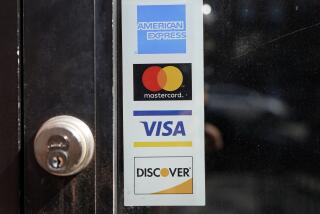Putting Proper Name on Your Debts
- Share via
Because almost everyone owes someone else money, it is useful to understand the legal classifications of debt.
Debt is the legal name for an IOU. There are basically two kinds of consumer debt--secured and unsecured.
A secured debt is relatively easy to collect and may survive bankruptcy in some form, while an unsecured debt is more difficult to collect and is “dischargeable in bankruptcy”--it vanishes if you file for bankruptcy.
Let’s understand which is which. If you buy a new stereo and use a bank credit card to pay for it, you have incurred an unsecured debt. If you borrow $1,000 from a friend and promise to pay him back next month, it is an unsecured debt. If you visit a doctor for a physical exam and he agrees to bill you for his services, rather than making you pay on your way out the door, that is also an unsecured debt.
In each of these examples, you promised to pay money, but you did not sign a written agreement that allows the creditor (the person owed the money) to repossess some of your property if you don’t pay. (This is called a security agreement.)
If you didn’t pay the debt you owed to the stereo store, neither the store nor the credit card company could repossess the stereo you bought because you had not signed a security agreement. The same principle applies to the doctor and your friend, if you refuse to pay them.
In each case, the person owed the money would have to sue you to collect the debt. And even if the store won a court judgment for the amount owed, it would have to use customary legal collection efforts, for example, by using a writ of execution to be paid from your wages or a bank account or other property you owned. In the meantime, you still would own the stereo.
On the other hand, if the stereo store had required you to sign a security agreement or a conditional sales agreement, it would have been much easier to collect the debt. The store would still need to sue you to win a judgment, but then could avoid the complicated steps necessary to collect the money by simply repossessing the stereo to satisfy the debt.
Security agreements are commonly used in the sale of automobiles, furniture, television sets and jewelry. If you are buying any of these or other big-ticket items, be sure you understand what you are signing. There is a difference between simply promising to pay on time on one hand, and agreeing in advance to let the seller repossess the property if you don’t pay. And when it comes to motor vehicles, state law allows the seller to repossess without going to court if you miss your payment.
Both unsecured and secured debts are discharged in bankruptcy, but with some secured debts, you may be required to return the property to the person who sold it to you or you must pay for it if you want to keep it.
Legal Brief
Los Angeles County offers a free mediation service available for a resident who wants to try to resolve a dispute without going to court. Administered by the County Department of Consumer Affairs, the Dispute Settlement Service handles a wide range of problems, including neighborhood disputes, landlord-tenant conflicts and disagreements with merchants. However, the service does not handle divorce, custody or criminal matters or disputes with government agencies. For more information, call (213) 974-0825 from 8 a.m. to 4 p.m.
Klein cannot answer mail personally but will respond in this column to questions of general interest about the law. Write to Jeffrey S. Klein, Legal VIEW, The Times, Times Mirror Square, Los Angeles 90053.
More to Read
Inside the business of entertainment
The Wide Shot brings you news, analysis and insights on everything from streaming wars to production — and what it all means for the future.
You may occasionally receive promotional content from the Los Angeles Times.






